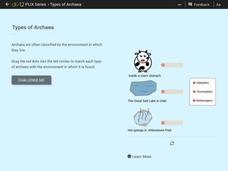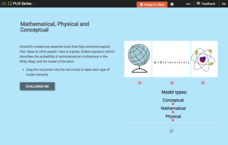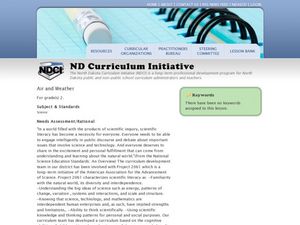CK-12 Foundation
Natural Selection: Of Seasons and Species
Do predators look for different things in different seasons? The quick interactive shows how some species survive longer in one season than another based on the conditions. The challenge questions encourage pupils to demonstrate that...
CK-12 Foundation
Limiting Factors to Population Growth: Graphing Population Growth
If any of the limiting factors in an environment change, both animal and plant populations also change. The video explains two different models of growth and the impact of limiting factors. It highlights the carrying capacity of an...
CK-12 Foundation
Types of Archaea
One of the few organisms that are classified by the environment in which they live include archaea. The video describes the phylogeny of the group and their major characteristics. It details how they reproduce and discusses the diversity...
CK-12 Foundation
Modeling: Mathematical, Physical and Conceptual
Scientific models help explain ideas and concepts to non-experts. The online activity covers conceptual, mathematical, and physical models. Through four multiple-choice questions and three discussion questions, scholars gain a deeper...
CK-12 Foundation
Latitude, Longitude, and Direction: Angle from the Equator
Which has the higher IQ, latitude or longitude? Longitude because it has 360 degrees! The interactive introduces the way latitude is measured and why it can never have more than 90 degrees. A handful of challenge questions encourage...
CK-12 Foundation
Seasons: Shadow Lengths
Before iPhones and calendars, how did humans determine the seasons of the year? Middle school scientists discover how to use shadows to determine the time of year in an enlightening interactive. Pupils manipulate the sun and examine the...
Novelinks
The Martian Chronicles: Double-Entry Journals
Teach learners to reflect on their reading with a lesson about double-entry journals. As they read Ray Bradbury's The Martian Chronicles, class members note interesting passages from the text on the left side of their page, and jot down...
Code.org
Practice PT - Tell a Data Story
Show your class how it all comes together. The last lesson in a unit of 15 has individuals take everything they learned in the data section to analyze the class-generated data. The pupils find a story they want to tell that appeals to...
Code.org
Practice PT - Design a Digital Scene
The final performance task for the unit requires class members to utilize what they have learned to create a personal digital scene. Groups work together to develop a scene and then, using top-down design, break the scene into manageable...
Code.org
Introduction to Data
Data, data everywhere. Challenge your class to begin thinking about data, the ways people collect information, and what we can learn from this data. Class members discuss sources of data and then individuals answer questions in the class...
Code.org
Looping and Random Numbers
Repetition, repetition, repetition. Get your class to efficiently repeat a section of code over and over again by introducing looping. Class members learn looping to quickly recreate objects they want to appear more than once in their...
American Museum of Natural History
They Glow!
Would you believe marine animals can make their own light? An online resource describes the process of bioluminescence and how animals in the ocean use it to survive. The lesson features a catchy tune that describes the behavior of ocean...
Curated OER
Earthquake Epicenter
Students use chart data to determine the location of the epicenter of an earthquake. This task assesses students' abilities to generalize and infer, organize data, interpret data, and apply mathematical concepts.
Curated OER
Air and Weather
Second graders study Earth's materials. In this air and weather lesson plan, 2nd graders note changes in the weather and examine tools that help us study the weather. Students analyze how changes in the environment make changes in the...
Curated OER
Hands on Habitat
Students teach others about habitats. In this Science lesson, students use a Science Log to record data about a habitat for research. Students analyze the data and construct an eco-chamber. Students share what they have found with other...
Curated OER
Investigating Evolutionary Questions: Bats, Whales, Reptiles, Birds, Animal Classification
Students are guided through a process in which three questions are addressed by retrieving beta hemoglobin sequences from online databases, and using online tools to compare those sequences in student-selected animals.
Curated OER
Using GLOBE Data to Study the Earth System (College Level)
Students use the GLOBE Website to locate and study environmental data. They use the GLOBE Graphing Tool to display data. Students describe the role of solar energy in the annual fluctuations of soil moisture. They describe reservoirs and...
Curated OER
Compare Human-made Objects with Natural Objects
Students examine and observe how many human-made objects get their basic design from things in nature. They listen to the book "Nature Got There First," compare/contrast hollow bones with drinking straws, bird beaks and tool pliers, and...
Curated OER
Me And My Shadow
Students investigate the concept of a shadow. They design a tool to create shadows for an experiment. They make observations and record the size and shape of shadows. The lesson contains background information for the teacher to deliver...
Curated OER
Mapping The Ocean Floor
Young scholars explore and analyze the bottom structure of underwater habitats. They describe and explain what can't see through the collection and correlation of accurate data. Learners assess that technology is utilized as a tool for...
Curated OER
Chemical Formulas
Students assess how to go from writing ionic chemical formulas to nomenclature and naming chemical compounds. They brainstorm former studies and share their thoughts in small groups. A list of everyday products (shampoos, toothpaste,...
Curated OER
Close to Home
Fourth graders examine habitats for animals by creating their own in class environment. In this environment lesson, 4th graders research the Internet for information on certain wild animals and the places in which they live. Students...
Curated OER
Life in a Forest Stream
Students assess macro-invertebrates from a stream. In this science lesson plan, students observe, classify and identify organisms found in a stream. A lab station is constructed at the stream sight and students study the different...
Curated OER
Race the Track! Design Challenge
Students use the design process to investigate physical science. In this force and motion activity, design a track to achieve a specified outcome. Students complete additional experiments with speed and distance. Students recognize the...

























